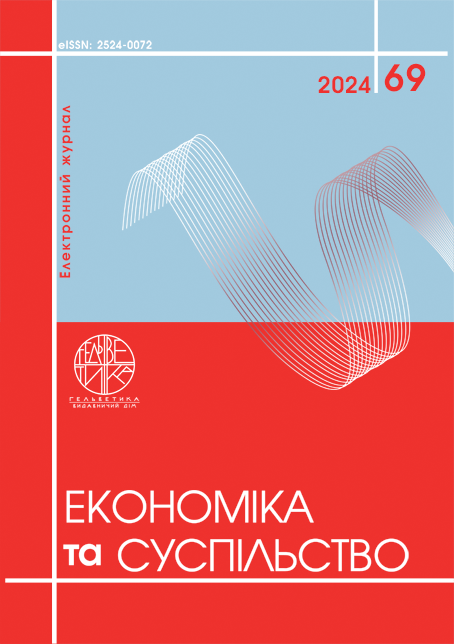FORMATION OF A DIGITAL MANAGEMENT SYSTEM IN THE RESTAURANT BUSINESS THROUGH THE PRISM OF METHODOLOGICAL APPROACHES
Abstract
The article is devoted to the study of modern digital trends and methodological aspects regarding the modeling process and the appropriate factor of the potential implementation of a modern solution in the system management of the restaurant industry. The main goal is to outline the components of the development of a digital management system necessary for the effective prosperity of the enterprise through the analysis of technological tools and innovative solutions already available on the market, as well as determining their level of effectiveness in relation to the overall projected improvement of the optimization process. The relevance of the research topic is determined by the transformational processes of the world order in the market of goods and services, including the transience of offers and changes in customer preferences along with the unstable economic field of interaction. The key feature of this topic is the continuation of post-COVID management, where each implemented entrepreneurial innovation is the creation of an image of security and facilitation for all elements of contact, in addition, it is a transition from basic control elements to modern ones with the provision of systematic review and adjustment. The research methodology consists in using a systemic approach based on data analysis and synthesis and a comparative method in connection with a partial comparison of Ukrainian capabilities and foreign practices of active use of digital programs. The results of the study highlight the key vectors of management, in which mass restructuring will take place based on cost reduction and service improvement with the possibility of combining agent interfaces, blockchains, IoT, biometrics and robotics, which are considered advanced and have significant significance during modeling specifically in the service sector (restaurants). The practical significance carries the potential for further development of digital strategies for business promotion in terms of management, as well as the general improvement of the restaurant sector from the position of the management level and their actions to increase competitiveness.
References
Беляк А. О. Вплив тенденцій цифровізації на розвиток суб’єктів господарської діяльності сфери гостинності. Modern Economics. 2022. № 35. С. 23–28. URL: https://doi.org/10.31521/modecon.V35(2022)-04 (дата звернення: 16.12.2024).
Миронова М., Миронов Ю. Показники ефективності діяльності підприємств індустрії гостинності. Сучасні технології менеджменту, інформаційне, фінансове та облікове забезпечення розвитку економіки в умовах євроінтеграції : Матеріали Всеукр. науково-практ. конф., м. Черкаси, 16–17 квіт. 2020 р. Черкаси, 2020. С. 517–520.
Яворська О. Г. Бізнес-аналітика як ідентифікатор бізнес-можливостей в корпоративній інформаційній системі підприємства. Сучасне управління організаціями: концепції, цифрові трансформації, моделі інноваційного розвитку : матеріали І Міжнар.наук.-практ.конф., м. Харків, 25 листоп. 2021 р. Київ, 2021. С. 114–117.
Яворська О. Г. Бізнес-аналітика як інструментарій підтримки прийняття рішень в ресторанному бізнесі. Вісник соціально-економічних досліджень. 2021. № 3-4 (78-79). С. 174–185.
Dn170495sve. ПриватБанк запустив перші в Україні біометричні POS-термінали. Privatbank. URL: https://privatbank.ua/news/2020/8/10/privatbank-zapustiv-pershi-v-ukrajini-biometrichni-pos-terminali (дата звернення: 16.12.2024).
Kothari A. 9 best business process modeling techniques (with examples). Tallyfy. URL: https://tallyfy.com/business-process-modeling-techniques/ (дата звернення: 16.12.2024).
Online parking booking system / K. R. Reshma et al. International journal of advanced research in science, communication and technology. 2022. Vol. 2, no. 1. P. 757–768. URL: https://doi.org/10.48175/ijarsct-7557 (дата звернення: 16.17.2024).
Principato L., Pratesi C. A., Secondi L. Towards zero waste: an exploratory study on restaurant managers. International journal of hospitality management. 2018. No. 74. P. 130–137. URL: https://doi.org/10.1016/j.ijhm.2018.02.022 (дата звернення: 16.12.2024).
Tai Y. F., Wang Y. C., Luo C. C. Technology-or human-related service innovation? Enhancing customer satisfaction, delight, and loyalty in the hospitality industry. Service Business. 2021. No. 15 (4). P. 667–694. URL: https://doi.org/10.1007/s11628-021-00461-w](дата звернення: 16.12.2024).
Zsarnoczky M. The digital future of the tourism and hospitality industry. Boston Hospitality Review. 2018. No. 6. P. 1–9.
Belyak, A. O. (2022). The impact of digitalization trends on the development of business entities in the hospitality sector. Modern Economics, (35), 23–28. https://doi.org/10.31521/modecon.V35(2022)-04
Mironova, M., & Mironov, Y. (2020). Performance indicators of hospitality industry enterprises. In Modern Management Technologies, Information, Financial, and Accounting Support for Economic Development in the Context of European Integration (pp. 517–520). Eastern European University of Economics and Management.
Yavorska, O. H. (2021). Business analytics as an identifier of business opportunities in a corporate information system of an enterprise. Modern Organization Management: Concepts, Digital Transformations, Models of Innovative Development (pp. 114–117). V. N. Karazin Kharkiv National University.
Yavorska, O. H. (2021). Business Analytics as a Decision Support Tool in the Restaurant Industry. Bulletin of Socio-Economic Research, (3-4 (78-79)), 174–185.
Dn170495sve. (2020, October 8). PrivatBank launched the first biometric POS-terminals in Ukraine. Privatbank. https://privatbank.ua/news/2020/8/10/privatbank-zapustiv-pershi-v-ukrajini-biometrichni-pos-terminali
Kothari, A. (2024, November 24)). 9 best business process modeling techniques (with examples). Tallyfy. https://tallyfy.com/business-process-modeling-techniques/
Reshma, K. R., Gladson, A. J., Akhil, K. R., Pavan, P., & Moulika, P. (2022). Online parking booking system. International Journal of Advanced Research in Science, Communication and Technology, 2(1), 757–768. https://doi.org/10.48175/ijarsct-7557
Principato, L., Pratesi, C. A., & Secondi, L. (2018). Towards zero waste: An exploratory study on restaurant managers. International Journal of Hospitality Management, (74), 130–137. https://doi.org/10.1016/j.ijhm.2018.02.022
Tai, Y. F., Wang, Y. C., & Luo, C. C. (2021). Technology-or human-related service innovation? Enhancing customer satisfaction, delight, and loyalty in the hospitality industry. Service Business, (15 (4)), 667–694. https://doi.org/10.1007/s11628-021-00461-w]
Zsarnoczky, M. (2018). The digital future of the tourism and hospitality industry. Boston Hospitality Review, (6), 1–9.

This work is licensed under a Creative Commons Attribution 4.0 International License.


